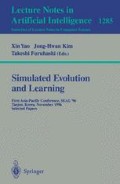Abstract
In this paper, we discuss about a competitive co-evolution model for acquiring strategies of games autonomously. To win a game, strategies of the game in various states are required. In the field of artificial life, genetic approaches are well known as an adaptive search algorithms. The genetic algorithm requires setting a fitness function and evaluating it to solve the problem. Autonomous acquisition of game strategy is difficult, because the fitness function can not be fixed in various states of the game. Co-evolution approach can improve this problem by simultaneous evolution of some genetically distinct populations. We discuss a competitive co-evolution model on the acquisition of game strategy and how to set the fitness function. Furthermore, we evaluate the method by applying it to simple games.
Preview
Unable to display preview. Download preview PDF.
References
D. E. Goldberg. (1989) Genetic Algorithms in Search, Optimization, and Machine Learning. Addison-Wesley.
Hiroaki Kitano. (1993) Genetic Algorithm. Sangyo-tosho (in Japanese).
C. D. Rosin and R. K. Belew. (1995) Methods of Competitive Co-evolution (Finding Opponents Worth Beating). In Sixth International Conference on Genetic Algorithms.
W. D. Hillis. (1991) Co-evolution parasites improve simulated evolution as an optimization procedure. Artificial Life II. Addison-Wesley.
P. J. Angeline and J. B. Pollack. (1993) Competitive Environments Evolve Better Solutions for Complex Tasks. In Fifth International Conference on Genetic Algorithms, pp264–270.
Author information
Authors and Affiliations
Editor information
Rights and permissions
Copyright information
© 1997 Springer-Verlag Berlin Heidelberg
About this paper
Cite this paper
Nerome, M., Yamada, K., Endo, S., Miyagi, H. (1997). Competitive co-evolution model on the acquisition of game strategy. In: Yao, X., Kim, JH., Furuhashi, T. (eds) Simulated Evolution and Learning. SEAL 1996. Lecture Notes in Computer Science, vol 1285. Springer, Berlin, Heidelberg. https://doi.org/10.1007/BFb0028539
Download citation
DOI: https://doi.org/10.1007/BFb0028539
Published:
Publisher Name: Springer, Berlin, Heidelberg
Print ISBN: 978-3-540-63399-0
Online ISBN: 978-3-540-69538-7
eBook Packages: Springer Book Archive

